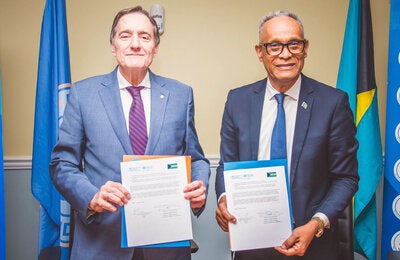

Experts on aging meeting at the Pan American Health Organization (PAHO) Friday said that active engagement of elderly people—economically, socially, and in policymaking and advocacy efforts—is essential to successfully meet the challenges of the world's aging population.
Experts on aging meeting at the Pan American Health Organization (PAHO) Friday said that active engagement of elderly people—economically, socially, and in policymaking and advocacy efforts—is essential to successfully meet the challenges of the world's aging population.
{slideshow}158,480,300,n{/slideshow}
However, "ageist" attitudes—including among public health advocates—remain a major impediment to such participation. "We need to change our perceptions of the roles and responsibilities of the elderly," said Sir George Alleyne, Director Emeritus of PAHO.
The March 2 meeting brought together aging experts from organizations in the United States and Canada to discuss World Health Day 2012, whose theme is healthy aging.
Catherine Gordon, Senior Public Health Advisor at the U.S. Centers for Disease Control and Prevention (CDC), agreed that active involvement by seniors is essential to efforts to improve their health. For one thing, research has repeatedly shown that elderly people benefit both physically and mentally from engaging in meaningful, productive activity, she said.
In addition, seniors have experience, skills and wisdom that can make important contributions to their societies and economies. "Those countries that learn to employ their elderly populations as economic and social assets are the countries that will win the global economic competition," said Gordon.
Gordon said the two major challenges facing advocates for public policy on aging are how to keep people active and functional for as long as possible, and how to find ways to care for those who become sick or dependent.
PAHO Deputy Director Jon K. Andrus noted that life expectancy in the Americas has increased by more than 20 years over the past half-century, which in itself is a major public health achievement. Today, he said, "we also have a unique window of opportunity to make adequate social and health investments to promote longer, healthier and more active lives while ensuring that aging populations do not become an economic burden for countries' development."



